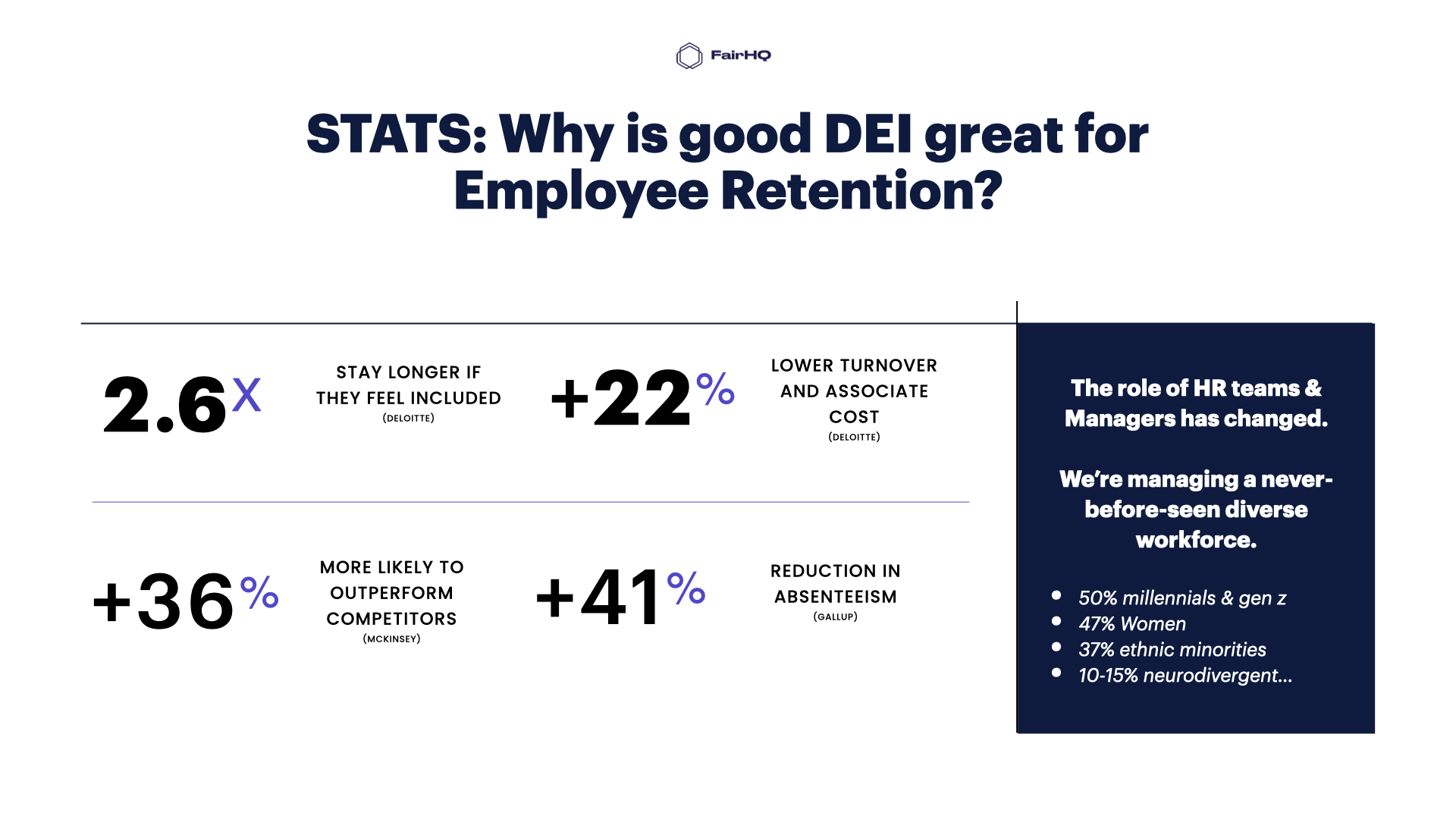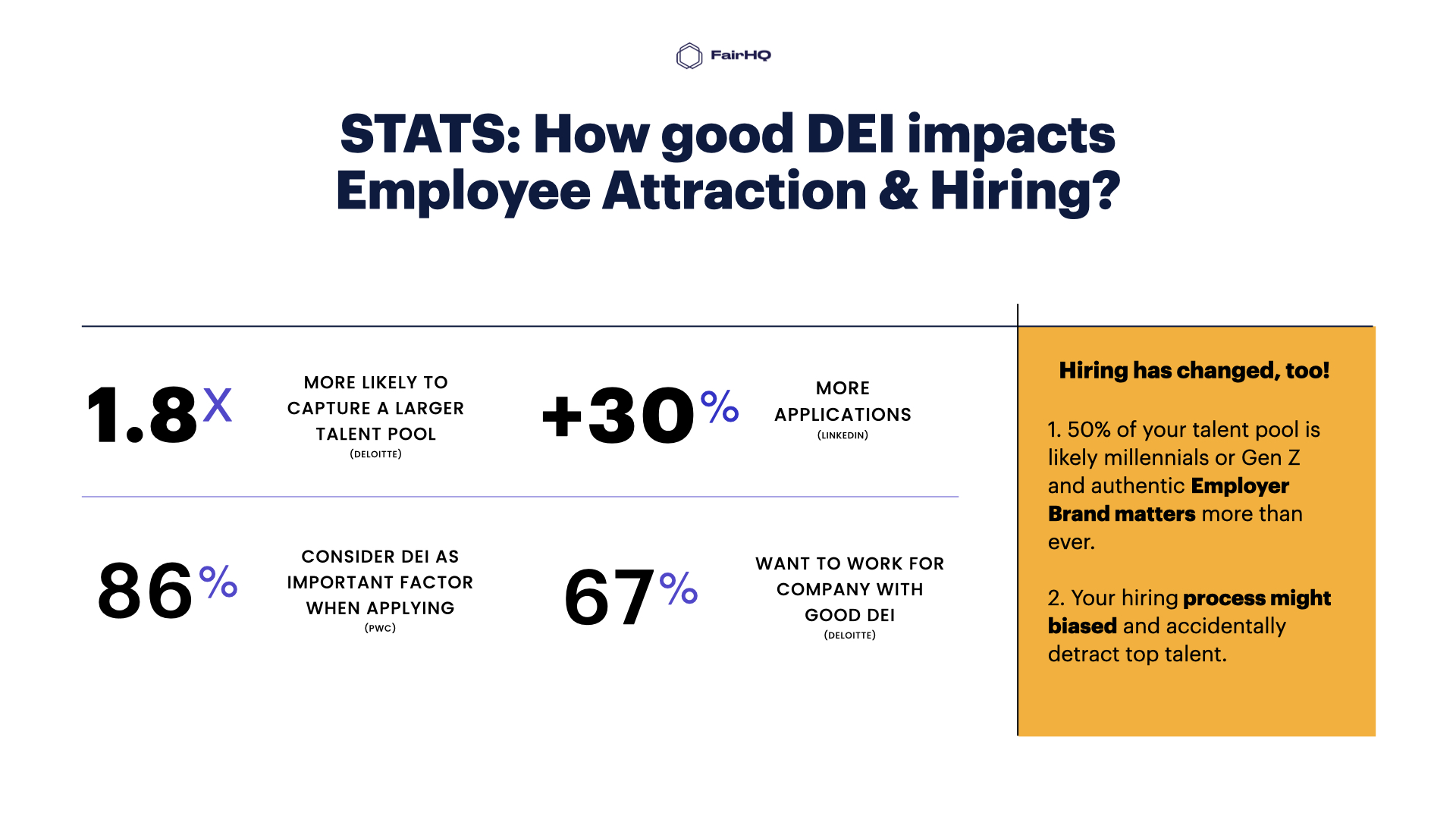Business Case For Diversity, Equity & Inclusion

Are you trying to build a business case for Diversity, Equity & Inclusion (DEI)? Here are the most solid research & numbers that prove why every company should invest in DEI.
The Business Case for Diversity, Equity, and Inclusion (DEI)
Diversity, Equity, and Inclusion (DEI) are no longer just ethical imperatives; they are key drivers of business performance. Organizations that actively embrace DEI strategies benefit from enhanced profitability, innovation, employee engagement, customer satisfaction, and risk management. Below, we dive into some of the compelling statistics and research findings that highlight why a strong DEI strategy is essential for modern business success.
1. Revenue Growth & Innovation
- 25% Greater Profitability: Companies in the top quartile for gender diversity on executive teams were 25% more likely to have above-average profitability compared to companies in the bottom quartile. (McKinsey & Company, 2020)
- 36% More Likely to Outperform: Firms with ethnically and culturally diverse executive teams were 36% more likely to outperform their peers in profitability. (McKinsey & Company)
- 19% Higher Innovation Revenue: Diverse management teams generate 19% more revenue from innovation, showing that inclusivity drives creative and financial success. (Boston Consulting Group)
2. Higher Financial Returns and Market Performance
- 45% More Market Share: Companies with higher diversity levels outperform competitors by 45% in market share due to their ability to meet diverse customer needs. (Harvard Business Review)
- 33% More Return on Equity (ROE): Companies with gender-diverse boards generate 33% more ROE than those without. (S&P Global)
- 10.1% Higher Return on Equity: Firms in the top quintile for gender diversity see a 10.1% increase in ROE and a 9.7% increase in earnings per share. (MSCI)
- 26% Higher Share Price Performance: Companies with at least one woman on the board outperform all-male boards by 26% in share price performance over six years. (Credit Suisse)
- 76% Customer Preference for Inclusive Brands: 76% of consumers from diverse backgrounds prefer to purchase from inclusive and diverse companies, enhancing brand loyalty and market reach. (Center for Talent Innovation)
3. Cost Savings through Employee Retention
- 41% Reduction in Absenteeism: Companies with engaged, diverse teams experience a 41% reduction in absenteeism and a 59% decrease in turnover, resulting in substantial cost savings. (Gallup)
- 22% Lower Turnover: Organizations with a strong DEI strategy saw 22% lower turnover, reducing recruitment and training expenses, which can equate to 150% of an employee’s salary. (Deloitte, 2018)
- 5x More Likely to Retain Employees: Inclusive workplaces are 5x more likely to retain employees, leading to lower turnover and stronger company culture. (LinkedIn Workplace Culture Report)

4. Increased Productivity & Engagement
- 87% Better Decision-Making: Diverse teams make better business decisions 87% of the time and can make these decisions twice as fast with fewer meetings. (Cloverpop)
- 6% Higher Productivity: Companies in complex work environments experience 6% higher productivity with workplace diversity. (MIT Sloan School of Management)
- 83% of Millennials Engaged in Inclusive Companies: 83% of millennials feel more engaged when they believe their workplace fosters an inclusive culture. (Deloitte Global Human Capital Trends)
5. Lower Hiring Costs & Increased Attraction
- 76% of job seekers say a diverse workforce is an important factor when evaluating companies and job offers. This figure is even higher among Millennials and Gen Z candidates, who now represent a significant portion of the workforce (Glassdoor).
- 86% of female millennials evaluate workplace policies on diversity, equality, and inclusion when choosing employers (PwC Report).
- 67% of Job Seekers Value Diversity: A 67% of candidates consider workplace diversity important when choosing a job, directly affecting a company’s talent pool. (Glassdoor)
- Firms with inclusive hiring practices are 1.8 times more likely to capture a larger talent pool, improving their access to top performers from a broader range of backgrounds (Deloitte).
- 30% more job applications: Companies with a strong focus on DEI receive 30% more job applications for their vacancies than those that don’t emphasize diversity in their recruitment process (Source: LinkedIn Talent Solutions).
6. Risk Management and Compliance
- Reduced Legal Risks: Companies with robust DEI strategies face fewer legal risks, saving on average $160 million annually in discrimination-related penalties. (EEOC)
- 10% Lower Cost of Capital: ESG-focused companies that prioritize diversity benefit from a 10% lower cost of capital and face fewer regulatory risks. (PwC)
- $16 Billion in Annual Turnover Costs in Tech: The tech industry alone loses $16 billion annually due to diversity-related workplace culture issues. (Kapor Center)
- 78% of Employees Expect DEI: A 78% of employees expect their employers to prioritize DEI, and failing to meet this expectation can lead to high turnover and reputational damage. (Glassdoor)

Summary of Business Benefits from DEI Strategies
- 25% greater profitability in gender-diverse leadership teams (McKinsey)
- 36% more likely to outperform with ethnically diverse executive teams (McKinsey)
- 19% higher innovation revenue from diverse management (BCG)
- 59% lower employee turnover and 41% reduction in absenteeism from engaged diverse teams (Gallup)
- 33% more return on equity (ROE) with gender-diverse boards (S&P Global)
- Expanded 45% market share and customer satisfaction with inclusive practices (Harvard Business Review)
These figures make a clear business case for prioritizing DEI, showing direct links between diversity, engagement, and financial performance across a wide range of metrics, including profitability, productivity, customer satisfaction, and risk management.
Resources and Citations
1.McKinsey & Company. “Diversity Wins: How Inclusion Matters.” 2020.
2.Boston Consulting Group (BCG). “How Diverse Leadership Teams Boost Innovation.” 2018.
3.Gallup. “The Engaged Workplace: Absenteeism and Turnover Statistics.”
4.Deloitte. “Global Human Capital Trends.” 2018.
5.Cloverpop. “Hacking Diversity with Inclusive Decision-Making.”
6.MIT Sloan School of Management. “The Effects of Diversity on Business Performance.”
7.Glassdoor. “Diversity & Inclusion Workplace Survey.”
8.Harvard Business Review. “How Diversity Drives Market Share and Customer Loyalty.”
9.Center for Talent Innovation. “The Business Case for Diversity in the Workplace.”
10.S&P Global. “Gender Diversity and Corporate Financial Performance.”
11.MSCI. “The Impact of Diversity on Economic Outcomes.”
12.Credit Suisse. “Gender Diversity and Corporate Performance.”
13.EEOC (Equal Employment Opportunity Commission). “Discrimination Charge Statistics.”
14.PwC. “The Impact of ESG on Capital and Operational Costs.”
15.Kapor Center. “The Cost of Turnover in the Tech Industry.”
16.LinkedIn. “Workplace Culture Report.”